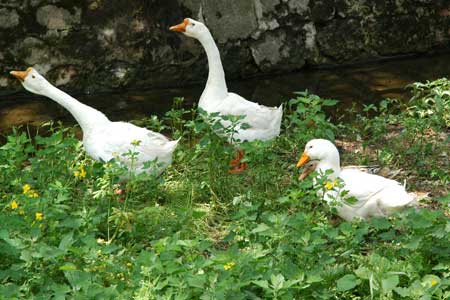
Ducks and geese get along well and may be kept together in the same area. Since most domestic duck breeds don’t fly well or at all, and some are too heavy to even walk fast, and since geese tend to be aggressive toward trespassers, keeping ducks and geese together offers the ducks some measure of protection from predators.
About Ducks
Ducks spend a lot of time in water, nibbling at plants, bugs, and other small-pond inhabitants. If you let them wander in your vegetable garden or flower bed, they will help control garden pests. But you have to take care they don’t run out of other things to eat and start in on your pansies or pea vines.
Ducks especially enjoy chasing flies, in the process offering not only fly control but endless entertainment. Ducks keep mosquitoes from getting beyond the larval stage, but unfortunately tadpoles suffer the same fate.
All ducks lay eggs, although some duck breeds lay better than others. Any duck may be raised for meat. Putting your excess ducks into the freezer both keeps delicious meat on your family table and controls the population at the pond.
Mallards like to fly around the yard, and occasionally one will fly away for good. Such wanderlust can be controlled by clipping a wing. Better yet, if your yard is small enough, cover the entire yard with netting.
For some poultry keepers, the primary downside to ducks is their eternal quacking. Among most breeds, the male makes little sound, but the female quacks loudly. Each bevy seems to appoint one particularly loud spokesduck to make all the announcements. Get rid of the loudmouth, and another one will take her place.
About Geese
Geese also make a racket with their honking. But usually they holler with good reason. A less observant human might not detect that reason: for instance, a cat or weasel the geese spotted slinking along the fence line.
Besides announcing intruders, geese have a tendency to run them off. A lot of people are more afraid of geese than of dogs. Probably that’s because they’re less familiar with geese and feel intimidated by the flat-footed body charge, indignant feather ruffling, and snakelike hissing of an aggressive goose. But even as geese fend off intruders, they can become attached to their owners and are less likely to charge the family dog or cat than intruding pets and wildlife.
Geese are active grazers, preferring to glean much of their own sustenance from tender vegetation. Farmers take advantage of their preference for tender shoots over established plants and use them as economical weeders for certain commercial crops.
Geese lay eggs, but no breed lays as well as the duck breeds bred for laying. Rather, geese lay just about enough eggs to reproduce. If you’re not into raising more geese, you might enjoy the culinary delights of goose eggs in season.
Goose meat, however, is plentiful and delicious. Goose is a traditional holiday meal, and when roasted correctly, the meat defies its reputation for being greasy. The fat rendered during the roasting makes terrific shortening for baking and may be used as a flavorful replacement for butter on bread.
So if you’re trying to decide whether to get ducks or geese, why not consider keeping ducks and geese together. Both have much the same needs in terms of shelter and feed, and with plenty of space to roam they should all get along fine.
And that’s today’s news from the Cackle Coop.
Gail Damerow is editor and principal author of Backyard Homestead Guide to Raising Farm Animals, which includes a chapter on waterfowl.

